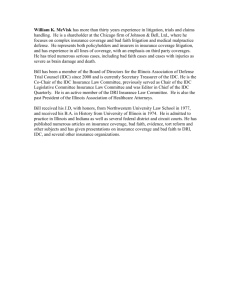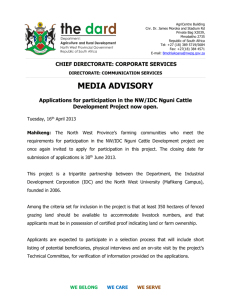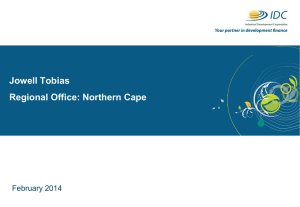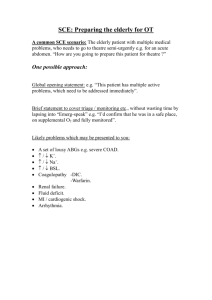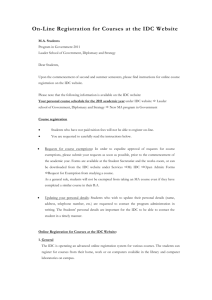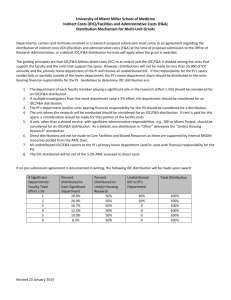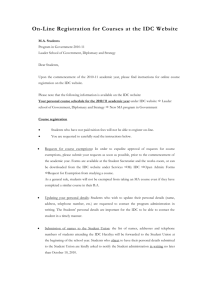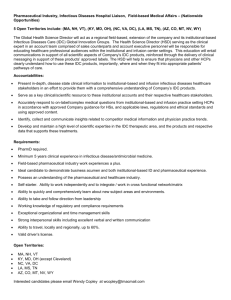see slides
advertisement
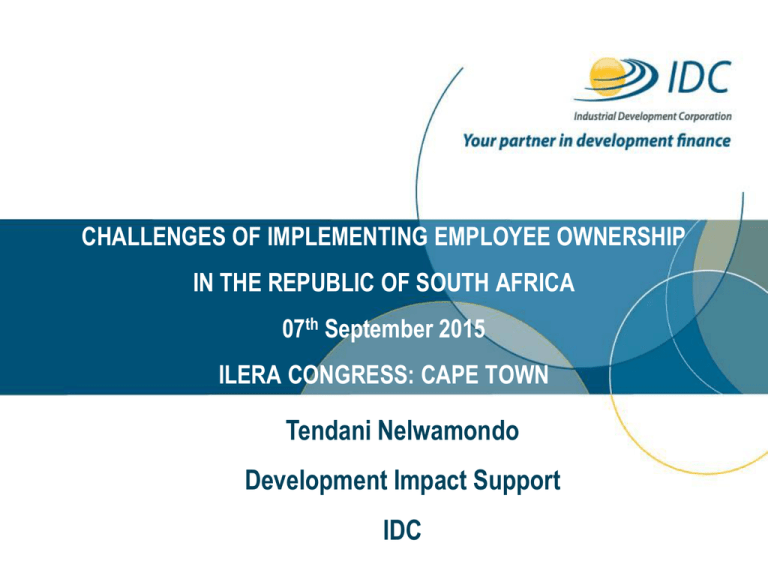
CHALLENGES OF IMPLEMENTING EMPLOYEE OWNERSHIP IN THE REPUBLIC OF SOUTH AFRICA 07th September 2015 ILERA CONGRESS: CAPE TOWN Tendani Nelwamondo Development Impact Support IDC Introduction • IDC Background • B-BBEE (Policy Perspectives) (Codes) • Trust Funded and Sectors • Composition of the Board of Trustees • Challenges of Implementing Employee Ownership in South Africa • Training and Education • The Role of the Association • Other Initiatives to Drive Change • Supplier and Enterprise Development • Way Forward • Conclusion 2 IDC Background • Established 1940 in terms of Industrial Development Corporation Act (Act No. 22 of 1940). IDC is fully owned by the South African government. • National Development Finance Institution – set up to promote economic growth and industrial development. • VISION – to be the primary source of commercially sustainable industrial development and innovation to benefit both South Africa and the rest of Africa. • MISSION – to contribute to the creation of balanced, sustainable economic growth in South Africa and on the rest of the continent. \Further promote entrepreneurship through the building of competitive industries and enterprises based on sound business principles. 3 B-BBEE Policy and Code of Good Practice • Broad Based Black Economic Empowerment Act of 2003 • The objective is to promote participation of blacks / marginalized groups in the economy by using various methods; (Blacks meaning Africans, Coloureds and Indians). Black Designated Groups meaning women, youth, employees, people with disabilities and rural communities; • Code of Good Practice (2007) • 7 elements (Old); • 5 Elements (New) 2013; 4 IDC Workers / Employee Trusts • IDC Workers Trust Policy target to benefit low level workers / employees • IDC has specialized Funds to finance employee ownership stake in companies Development Fund capitalized at ca R350 million and capped at ca R20 million per transaction (not specific on shareholding but is suppose to be meaningful); Risk Capital Facility (RCF) – 25% + 1 shareholding; • To date, IDC has funded and supported plus minus 70 Workers Trust in various sectors since 1998 (some of these transactions has exited IDC or cancelled or liquidated). • IDC has spent ca R500 million to fund workers participation through concessionary loans. • The Workers Trust owns an average of 10% shareholding in the company. 5 Funders for Employee Ownership in SA • • • • • • IDC through Development Funds and Risk Capital Facility (RCF) National Empowerment Fund Development Bank of Southern Africa PIC Government departments Department of Rural Development and Land Reform Farm Equity Scheme • National Department of Agriculture 6 IDC Trust Funded and Sectors • Agro Processing *** • Light Manufacturing and Tourism** • Clothing and Textiles* • Automotive and Transport ** • Basic and Speciality Metals* • Chemical Products and Pharmaceutical ** • Heavy Manufacturing • Industrial Infrastructure • Machinery and Equipment • Media and Motion Pictures • Metals and Mining • New Industries 7 Composition of Board of Trustees • The recommended legal entity to hold shares for the benefit of Workers / employees is a TRUST. • The Trust is registered in terms of the Trust Property Control Act of 1988 as amended. • The recommended Board of Trustees composition: At least 2 or 3 representative from the workers / employees / beneficiaries At least 1 representative from Management; At least 1 representative from the funder (IDC); At least certain number (1 or 2) from the Independent Trustee 8 Training and Education • Training and education is the key to the success of any Trust, example of basic training that need to be provided: Corporate Governance; Directorship Training; Basic Business Principle; Financial Management; Investment Planning; Change Management; Leadership Training; Effective models to distribute the benefits 9 Challenges of Implementing Employee Ownership (EO) in SA • Realization of benefits by target beneficiaries; • Funding models utilized to fund employee participation; • Repayment of loans using dividends; • Wages / salary increase strikes / labour unrest; • Training and education; • Understanding of EO objectives; • Information dissemination to beneficiaries and other relevant stakeholders. • A lack of equity to pay for shares and lack of resources or assets needed to secure traditional bank finance (At IDC have specialized funding) • The role of the company on the Workers Trusts. • Engagement approach / Strategy / plan. 10 Challenges of Implementing Employee Ownership in SA • Economic development vs compliance with B-BBEE • Plan / Strategy with stakeholders internally • No documented research, lesson learnt and best practices in the country (Employee Ownership is always sounds / looks new in South Africa); • Appointment of Trustees; • Independent Trustees related Trustee fees and their locality; • Management of immediate expectations by identified beneficiaries; • Suspected mismanagement of funds; • Lack of commitment from management / shareholders to empower / mentor trustees / beneficiaries; • Day to day administration of the Trusts. 11 Key Principles of Making Community Trust Success • Involvement / Engagement; • Sharing of Information; • Training and Education; • Regular feedback to the Trustees / beneficiaries; • The rights of the Owners / Shareholders / Management; 12 Key Roles of the Association • The Voice of Employees on the ownership rights. • Conduct research, best practice and documents lesson learnt. • Advocacy for EO in the Country in various sectors. • Influence and lobby for government funding to finance employee ownership initiatives to drive job creation and fair distribution of wealth. • Influence and lobby government on Policy Formulation that support development of EO. 13 Other Initiatives to Drive Change • Develop new Funding Models that can facilitate early realisation of benefits to target beneficiaries: Partner with Government Incentives / Grants to Employee Ownership Shareholding; Trickle Dividends; Free Carry Shares / Discounted Shares • SPECIAL FUNDING Focusing on other sectors like Franchising; Funding 100% Employee Owned Business; • The initiatives have potential to accelerate implementation of EO, drive job creation & distribute wealth to the poor; • It will further reduce the high rate of wage or salary increase strikes (Minimum Wages); 14 Supplier and Enterprise Development • Encourage companies with EO to provide procurement opportunity/ies to Trusts; • Provide vendor finance for the Enterprise Development (ED); • Establish a fund to finance the initiative; • The initiative can be implemented even if employees doesn’t own equity portion in the company; • Claim points on ED 15 Way Forward • Establishment of the Specialised Fund to fund and support Employee Ownership shareholding (including 100% ownership by employees); • Funding to the establishment of Employee Ownership Association of South Africa (EOASA). IDC is willing to finance the portion of the fund to finance the establishment of EOASA. • Conduct a detailed Research on EO in South Africa funded by different funders e.g. IDC, DBSA, NEF, Commercial Banks, vendor financing, government departments, donation of shares by companies and Private sector. 16 Conclusion • Team work or partnership is of critical significance to achieve the set objectives on the Trust Deed and other related documents. • Sustainable implementation of EO is a key priority for uplifting / improving the socio-economic livelihoods of the targeted beneficiaries. • It will significantly impact to the debate / negotiations of minimum wages by various sectors in the economy. 17 Thank you / Ndo livhuwa Industrial Development Corporation 19 Fredman Drive, Sandown PO Box 784055, Sandton, 2146 South Africa Telephone 011 269 3000 Facsimile 011 269 2116 E-mail callcentre@idc.co.za
